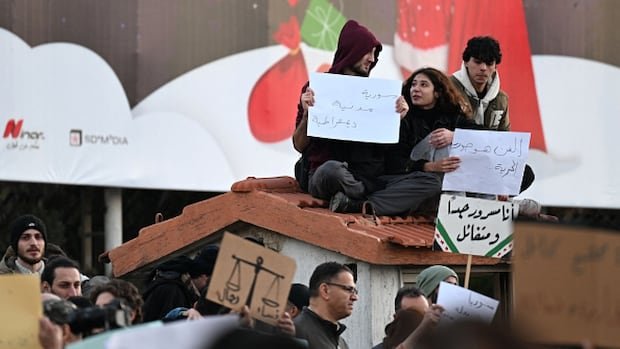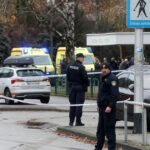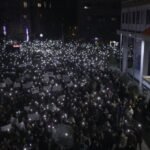U.S. officials will be in Damascus on Friday for talks with the country’s new leaders. This is the first group of American diplomats to officially visit Syria in more than a decade, since Washington closed its embassy in Damascus in 2012.
Assistant Secretary of State for Near Eastern Affairs Barbara Leaf, former special envoy for Syria Daniel Rubinstein and the Biden administration’s chief envoy for hostage negotiations Roger Carstens traveled for talks with Syria’s transition leaders, the State Department said early Friday.
“They will speak directly to the Syrian people, including members of civil society, activists, members of diverse communities, and other Syrian voices, about their vision for their country’s future and how the United States can support them,” the state department said .
The group will emphasize the principles of inclusion, protection of minorities and opposition to terrorism and chemical weapons that the Biden administration believes will underpin U.S. support for a new government following the overthrow of President Bashar al-Assad earlier this year Year was formed, month will be of crucial importance. Assad fled and was granted asylum by his patron Russia, ending his family’s decades-long rule over Syria.
The US delegation’s trip follows contacts with France and Britain in recent days.

Golani was once wanted by the USA
U.S. President Joe Biden and his top aides called the fall of Assad a historic opportunity for the Syrian people, who have lived under his repressive rule for decades, but also warned that the country faces a period of risk and uncertainty.
The rebel group that led the attack on Damascus that forced Assad to flee – Hayat Tahrir al-Sham, or HTS – is designated a foreign terrorist organization by the United States, Canada and others. The designation came after the Nusra Front, the HTS’s predecessor, carried out suicide attacks that killed civilians and promoted a violent sectarian vision.
Rebel leader Abu Mohammed Al-Golani is expected to play an important role in Syria’s future. The National’s Ellen Mauro explains how he rose through the ranks of the rebels and what impact his leadership could have on the country.
Although this designation comes with a number of sanctions, it does not prohibit US officials from speaking to its members or leaders.
HTS replaced Assad family rule with a three-month interim government that had ruled a rebel enclave in Syria’s northwestern Idlib province.
The State Department said Rubinstein, Leaf and Carstens would meet with HTS officials, but did not say whether the group’s leader, Ahmad al-Sharaa – better known as Abu Mohammed Al-Golani – would be among those they would meet .
Seven years ago, the FBI offered a reward of up to $10 million for information on the whereabouts of Golani, now 42.
In 2003, he joined insurgents fighting U.S. troops in Iraq. The Syrian native was held for a time by the U.S. military but was released and eventually found his way back to Syria, where he founded the Nusra Front before eventually breaking away from former al-Qaeda and ISIS ties.
As Syrians in Canada gathered in the days after the collapse of Bashar al-Assad’s oppressive regime to understand what had happened and share their hopes for the future, raw emotions poured into play.
Golani has conducted interviews with Western media in recent weeks; U.S. officials say Golani’s public statements on protecting minority and women’s rights are welcomed, but they remain skeptical about whether he will follow through on them in the long term.
The diplomats’ visit to Damascus will not result in the immediate reopening of the U.S. Embassy, which is under the protection of the Czech government, according to U.S. officials, who said decisions on diplomatic recognition would be made when the new Syrian authorities spell out their intentions clear.
The troop strength is more than twice as high as previously known
While the United States has suspended operations at its embassy in Damascus during the country’s civil war, US troops are engaged in the fight against the Islamic State militant group in small parts of Syria.
But the Pentagon announced Thursday that the U.S. had doubled the number of its forces in Syria to fight ISIS to 2,000 troops before Assad’s fall.
“These additional forces are considered temporary rotational forces that are deployed to meet changing mission requirements while the 900 core soldiers operate on a longer-term basis.”
The U.S. has also significantly increased airstrikes against ISIS targets amid concerns that a power vacuum would allow the militant group to regroup.
Washington remains concerned that the extremist group ISIS could seize the moment to resurgence and also wants to avoid clashes in the northeast of the country between Turkish-backed rebel groups and U.S.-allied Kurdish militias.
A priority for American officials will be finding information about the whereabouts of missing U.S. journalist Austin Tice and other American citizens who went missing during the Assad regime.
Tice disappeared at a checkpoint in a contested area west of Damascus as the Syrian civil war intensified. A video released weeks after Tice’s disappearance showed him blindfolded, being held by gunmen and saying, “Oh, Jesus.”
Nothing has been heard from him since then. Assad’s government publicly denied holding him.







